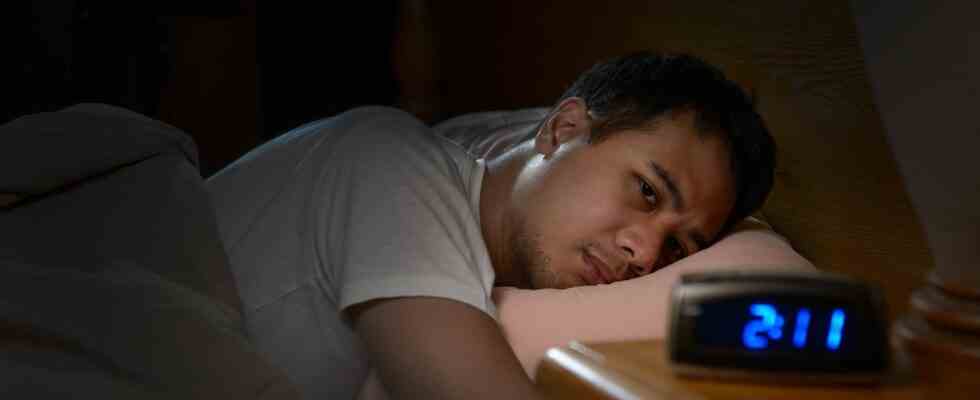neuroscientist
Night rest: Why sleep is so important, especially in times of crisis
The alarm clock rings at 6 a.m., but sleep is out of the question – tips for a better sleep
© amenic18/Getty Images
Images of horror, the suffering of war – a nightmare that haunts many into the night and brings them a good night’s sleep. A sleep researcher gives tips on how we can sleep better in times of crisis.
Especially when we want to sleep, images of war and suffering people seem to appear in our mind’s eye and won’t let us go. “The fact that we worry and fear a lot, especially at night, is due to our brain function – our emotions are particularly strong and brain regions that rationalize feelings are less active,” says sleep researcher and book author Dr. Christian Benedict from Uppsala University. “Of course, the images of war are not easy to shake off, times of crisis have an impact on us. What we go through as a society also affects our sleep and leads to people not being able to sleep well.” It is important to acknowledge this and not to downplay it.

Christian Benedict is a neuroscientist and explains in his book “Sleep is the best medicine”why good sleep is so important.
© Stefan Tell
Nevertheless, even in times of crisis, we should not take sleep lightly, says Christian Benedict. “Research shows that dream sleep in particular helps us to separate feelings from experiences and to downscale the feelings.” An example: In studies, participants were shown pictures of threatening situations (e.g. the victim of a traffic accident, a shark that is about to open its mouth, or a gun pointed at you). Looking at the pictures activates the so-called amygdala in the brain, which initiates the flight and fight reactions.
Sleep ensures that our brain does not bring the organism into a complete state of alarm again the second time we look at the pictures, but we are aware of the threat of the pictures, but no longer have to act out the feelings to the same extent. The physical stress response is less strong. Sleep can also make a therapeutic contribution here,” says the sleep researcher. There are ways to switch off in the evening and sleep better even with this news situation, the war in Europe’s front yard and the fear of a nuclear threat in the back of your mind.
The sleep researcher’s advice:
mental breaks
“Of course we’re dealing with the war in Ukraine, it’s on our minds, we sympathize, but it’s important that we give ourselves mental breaks,” advises Benedict. These are times that you don’t spend in front of the screen of your smartphone, tablet or laptop. Although everyone has different sensitivities, it is better not to check the latest news and updates on the war just before going to bed: “This news consumption leads to us stressing, being tense, not being able to rest and sleeping badly .” The expert tip: Stop looking at the TV, smartphone or social media an hour before you go to bed. Mental breaks should also be integrated into everyday life during the day.
Talk with friends
It is important to keep in touch with family, friends and relatives and to exchange ideas – as the current pandemic situation allows. “The exchange and the conversations with family or friends help us to express our fears and to unload ballast. But we can also rationalize our fears in this way.”
Use evening rituals
Nighttime rituals can help us calm down and prepare for sleep, says Benedict. An idea: “I can write down what I would like to do the next day. This helps to prepare for the next day, to plan mental breaks and at the same time to distract myself before bed and to take time for myself.”
Prepare for the night during the day
If you think about the evening in the morning, you can sleep better. “Being physically active during the day, eating during the day, getting plenty of daylight, hanging out with friends, it helps my internal clock to understand where we are.” Christian Benedict knows that routines and structure are good for our inner clock as our clock. “In the evening I should also calm down and reduce my activities, then I’ll prepare myself well for the night.” Means: It’s better to do a hard workout in the morning and just go for a walk in the evening to wind down.
interrupt the merry-go-round
Who doesn’t know it: The alarm clock is set for 6 a.m., but at 2.30 a.m. you suddenly lie wide awake in bed, your thoughts are spinning and sleep is no longer an option. “If the family or living situation allows it, it’s best to go into the living room and distract yourself, for example. That way the merry-go-round of thoughts doesn’t increase in speed.” The sleep researcher advises reading a book, listening to a podcast, an audio book or music as a distraction. It is better to avoid bright lights, the television or the news. When tiredness returns, sleep seekers should go back to bed.




